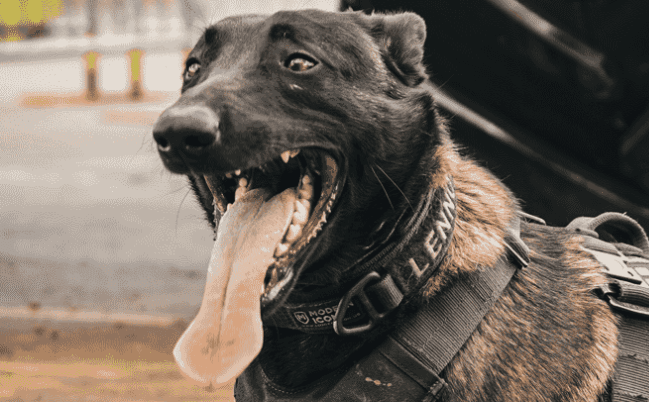Table of Contents
Dogs have an incredible sense of smell, which is thousands of times more powerful than humans. This remarkable ability allows them to detect a wide range of scents, from drugs and explosives to diseases like cancer. But what about nicotine? Can dogs smell nicotine, and if so, how? In this article, we will explore whether dogs can detect nicotine, the science behind their sense of smell, and how nicotine might affect them.
The Power of a Dog’s Sense of Smell
A dog’s sense of smell is truly extraordinary. While humans have approximately 5 million scent receptors in their noses, dogs boast an impressive 300 million. This gives dogs the ability to detect even the faintest odors. Their sense of smell is not only more sensitive but also more complex, as they can differentiate between multiple scents at the same time.
This heightened olfactory sense allows dogs to be trained for various purposes, such as search and rescue, detecting drugs, or identifying medical conditions like seizures and low blood sugar. The question is, can dogs use this powerful sense of smell to detect nicotine?
Can Dogs Smell Nicotine?
Nicotine, like many other substances, has a distinct chemical structure that produces a recognizable scent. While nicotine is not as pungent as some substances like marijuana or cocaine, it is still detectable to a dog’s highly sensitive nose. Dogs trained to detect specific substances can often detect nicotine in various forms, such as in tobacco products, vapes, and nicotine pouches.
- Nicotine in Cigarettes and Tobacco Products: Dogs can detect nicotine residue left on cigarettes, cigars, and other tobacco products. If a dog is trained to smell nicotine, they can often find traces of it in places where smoking has occurred, such as clothing, vehicles, and even the air in a room.
- Nicotine in Vape Pens and E-cigarettes: Vaping products that contain nicotine also have a distinct scent, though it may not be as strong or immediate as the smoke from traditional cigarettes. However, if a dog has been trained to detect nicotine, it can still smell the chemical residues that remain in the air or on surfaces.
- Nicotine in Nicotine Pouches: While the scent of nicotine pouches might be subtle, a trained dog could still detect the presence of nicotine in these products, particularly if there are residues on hands or packaging.
How Do Dogs Detect Nicotine?
Dogs detect nicotine, and other substances, by sniffing out the chemical compounds that make up the substance. Nicotine has a distinctive chemical profile, which allows dogs to differentiate it from other substances, even if it is in trace amounts.
When a dog is trained to detect nicotine, they are taught to recognize the scent and alert their handler when they come across it. This is done through a process of positive reinforcement training, where the dog is rewarded each time they successfully detect the substance.
Although dogs have the ability to smell nicotine, their ability to detect it may vary depending on factors such as the concentration of nicotine, the type of substance (e.g., tobacco, vape, nicotine pouch), and whether the dog has been trained to identify nicotine specifically.
Are Dogs Used to Detect Nicotine?
While dogs have been primarily trained to detect substances like drugs, explosives, and firearms, there are instances where they have been used to detect nicotine as well. For example, sniffer dogs can be trained to detect nicotine on individuals or in areas where smoking or vaping has occurred, especially in places like airports, correctional facilities, or schools where smoking may be prohibited.
However, it is less common for dogs to be trained specifically for nicotine detection compared to other substances like marijuana or heroin. Nicotine detection usually occurs when the substance is related to illegal or restricted activity, such as smuggling nicotine products into restricted areas.
Can Dogs Be Affected by Nicotine?
While dogs can detect nicotine, it’s important to note that nicotine is harmful to dogs if ingested. Dogs are more sensitive to nicotine than humans, and even small amounts can be toxic. Nicotine poisoning in dogs can occur if they chew on nicotine patches, vape pens, or tobacco products.
Symptoms of nicotine poisoning in dogs can include:
- Vomiting
- Drooling
- Diarrhea
- Increased heart rate
- Tremors or seizures
If a dog is suspected of ingesting nicotine, it is important to seek veterinary care immediately.
Why Would Dogs Be Used to Smell Nicotine?
Though it is not as common as using dogs to detect illicit drugs or explosives, there are a few scenarios where nicotine detection by dogs might be beneficial:
- Airport and Border Security: Dogs could be used in airports or at borders to detect individuals attempting to smuggle tobacco or nicotine products illegally. This is particularly relevant in places where the import or sale of such products is heavily regulated.
- Schools and Correctional Facilities: In environments like schools or correctional facilities where smoking is prohibited, dogs might be employed to ensure that no tobacco products or nicotine-containing items like vapes are being brought onto the premises.
- Health and Safety: In healthcare settings, dogs could potentially be trained to detect nicotine exposure in people, especially those who may be smoking or using nicotine products in environments where smoking is not allowed.
Can Nicotine Affect a Dog’s Behavior?
Nicotine can also have a behavioral impact on dogs, though not in the way it affects humans. As mentioned, nicotine is toxic to dogs and can cause a range of symptoms when ingested. If a dog experiences nicotine poisoning, their behavior may change as a result of the discomfort and distress caused by the poisoning.
In rare cases, prolonged exposure to nicotine from handling tobacco products or being around smokers may have an effect on the dog’s health and behavior, but this is less common compared to more immediate signs of nicotine toxicity from ingestion.
Conclusion
While nicotine is not as pungent as some substances, dogs can indeed smell nicotine, thanks to their extraordinary sense of smell. Whether it’s nicotine from tobacco, e-cigarettes, or nicotine pouches, a dog trained to detect nicotine can locate traces of the substance, even in small quantities. While nicotine is typically used in specialized detection situations, such as security and health checks, it is important to remember that nicotine is toxic to dogs if ingested, so care should always be taken to ensure they do not come into contact with nicotine products.
For those looking for nicotine-related products, such as Echi nicotine pouches, feel free to check out Snuffmint Shop for a wide range of products. If you have questions, you can also reach us on WhatsApp at +852-90568182.







